-
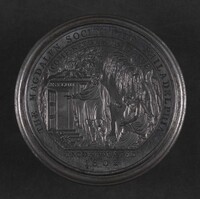 Magdalen Society of Philadelphia seal, undated
Magdalen Society of Philadelphia seal, undated The official seal and die of the Magdalen Society of Philadelphia displays a woman in anguish aided by a sanguine man who points the way to asylum. Symbolically, the woman appears next to a willow tree and the man an olive tree. Both figures appear in classical garb: the women dones a peplos and the man a chiton and chlamys.
-
 Magdalen Society of Philadelphia minutes of the weekly visiting committee, 1885-1912
Magdalen Society of Philadelphia minutes of the weekly visiting committee, 1885-1912 The function of the Magdalen Society's visiting committee was to monitor the women living in the asylum. The minutes provide details into the background and progress of the Society's inmates, and describe the behavior of those applying for release. Pages 257 to 471 of this volume are blank.
-
 Magdalen Society of Philadelphia minutes of the weekly visiting committee, 1878-1885
Magdalen Society of Philadelphia minutes of the weekly visiting committee, 1878-1885 The function of the Magdalen Society's visiting committee was to monitor the women living in the asylum. The minutes provide details into the background and progress of the Society's inmates, and describe the behavior of those applying for release.
-
 Magdalen Society of Philadelphia matron's diary, 1916-1917
Magdalen Society of Philadelphia matron's diary, 1916-1917 The matron's diary was maintained throughout the late nineteenth and early twentieth century while the Society was under the auspices of Elizabeth Freeberger. The manuscripts reveal the day to day happenings of the Society, including admission and dismissal information and stories about the women who lived in the house. They also detail the matrons' education strategies and approaches to reforming the inmates through work and prayer.
-
 Magdalen Society of Philadelphia matron's diary, 1912-1916
Magdalen Society of Philadelphia matron's diary, 1912-1916 The matron's diary was maintained throughout the late nineteenth and early twentieth century while the Society was under the auspices of Elizabeth Freeberger. The manuscripts reveal the day to day happenings of the Society, including admission and dismissal information and stories about the women who lived in the house. They also detail the matrons' education strategies and approaches to reforming the inmates through work and prayer. Pages 19 and 20 are missing in this volume.
-
 Magdalen Society of Philadelphia matron's diary, 1908-1912
Magdalen Society of Philadelphia matron's diary, 1908-1912 The matron's diary was maintained throughout the late nineteenth and early twentieth century while the Society was under the auspices of Elizabeth Freeberger. The manuscripts reveal the day to day happenings of the Society, including admission and dismissal information and stories about the women who lived in the house. They also detail the matrons' education strategies and approaches to reforming the inmates through work and prayer. Pages 19 and 20 are missing in this volume.
-
 Magdalen Society of Philadelphia matron's diary, 1906-1908
Magdalen Society of Philadelphia matron's diary, 1906-1908 The matron's diary was maintained throughout the late nineteenth and early twentieth century while the Society was under the auspices of Elizabeth Freeberger. The manuscripts reveal the day to day happenings of the Society, including admission and dismissal information and stories about the women who lived in the house. They also detail the matrons' education strategies and approaches to reforming the inmates through work and prayer. Pages 147 to 200 of this volume are blank.
-
 Magdalen Society of Philadelphia matron's diary, 1898-1906
Magdalen Society of Philadelphia matron's diary, 1898-1906 The matron's diary was maintained throughout the late nineteenth and early twentieth century while the Society was under the auspices of Elizabeth Freeberger. The manuscripts reveal the day to day happenings of the Society, including admission and dismissal information and stories about the women who lived in the house. They also detail the matrons' education strategies and approaches to reforming the inmates through work and prayer.
-
 Magdalen Society of Philadelphia matron's diary, 1891-1898
Magdalen Society of Philadelphia matron's diary, 1891-1898 The matron's diary was maintained throughout the late nineteenth and early twentieth century while the Society was under the auspices of Elizabeth Freeberger. The manuscripts reveal the day to day happenings of the Society, including admission and dismissal information and stories about the women who lived in the house. They also detail the matrons' education strategies and approaches to reforming the inmates through work and prayer.
-
 Magdalen Society of Philadelphia matron's diary, 1885-1891
Magdalen Society of Philadelphia matron's diary, 1885-1891 The matron's diary was maintained throughout the late nineteenth and early twentieth century while the Society was under the auspices of Elizabeth Freeberger. The manuscripts reveal the day to day happenings of the Society, including admission and dismissal information and stories about the women who lived in the house. They also detail the matrons' education strategies and approaches to reforming the inmates through work and prayer.
-
 Magdalen Society of Philadelphia matron's diary, 1881-1885
Magdalen Society of Philadelphia matron's diary, 1881-1885 The matron's diary was maintained throughout the late nineteenth and early twentieth century while the Society was under the auspices of Elizabeth Freeberger. The manuscripts reveal the day to day happenings of the Society, including admission and dismissal information and stories about the women who lived in the house. They also detail the matrons' education strategies and approaches to reforming the inmates through work and prayer.
-
 Magdalen Society of Philadelphia matron's diary, 1878-1881
Magdalen Society of Philadelphia matron's diary, 1878-1881 The matron's diary was maintained throughout the late nineteenth and early twentieth century while the Society was under the auspices of Elizabeth Freeberger. The manuscripts reveal the day to day happenings of the Society, including admission and dismissal information and stories about the women who lived in the house. They also detail the matrons' education strategies and approaches to reforming the inmates through work and prayer.
-
 Magdalen Society of Philadelphia matron's diary, 1829-1835
Magdalen Society of Philadelphia matron's diary, 1829-1835 The matron's diary was maintained throughout the late nineteenth and early twentieth century while the Society was under the auspices of Elizabeth Freeberger. The manuscripts reveal the day to day happenings of the Society, including admission and dismissal information and stories about the women who lived in the house. They also detail the matrons' education strategies and approaches to reforming the inmates through work and prayer.
-
 Magdalen Society of Philadelphia register, 1878-1910
Magdalen Society of Philadelphia register, 1878-1910 The admission and discharge records trace the flow of inmates of the Magdalen Society. They also disclose detailed information about the lives of inmates and serve as a window to nineteenth century attitudes towards family and women. The manuscripts were fastidiously kept from 1836 until the Society’s transition to the White-Williams Foundation in 1917, and provide inmate names and dates of occupancy. Brief descriptions of discharge are often given. Many women were sent back to their families or simply left at their own volition, while others are noted to have “escaped” or were ejected for “improper conduct.” Women who died in the house are regularly indicated to have been interred in the yard of the property. Some accounts offer more substantive background information. The first entry of the Society’s register, for instance, recounts the admission of a young girl who was spurned by her family for being “seduced…by her father’s coachman.” Indeed, family member death or neglect are some of the most common remarks provided. The admission and discharge records are a boon to researchers interested in post-revolutionary philanthropic organizations and the history of women and society in general in the nineteenth and early twentieth centuries. Pages 365 to 492 of this volume are blank.
-
 Magdalen Society of Philadelphia records of admissions and discharges, 1908-1917
Magdalen Society of Philadelphia records of admissions and discharges, 1908-1917 The admission and discharge records trace the flow of inmates of the Magdalen Society. They also disclose detailed information about the lives of inmates and serve as a window to nineteenth century attitudes towards women and family life. The manuscripts were fastidiously kept from 1836 until the Society’s transition to the White-Williams Foundation in 1917, and provide residents' names and dates of occupancy. Brief descriptions of discharge are often given. Many women were sent back to their families or simply left at their own volition, while others are noted to have “escaped” or were ejected for “improper conduct.” Women who died in the house are regularly indicated to have been interred in the yard of the property. Some accounts offer more substantive background information. The first entry of the Society’s register, for instance, recounts the admission of a young girl who was spurned by her family for being “seduced…by her father’s coachman.” Indeed, family member death or neglect are some of the most common remarks provided. The admission and discharge records are a boon to researchers interested in post-revolutionary philanthropic organizations and the history of women and society in general in the nineteenth and early twentieth centuries. Pages 104 to 301 of this volume are blank.
-
 Magdalen Society of Philadelphia records of admissions and discharges, 1878-1908
Magdalen Society of Philadelphia records of admissions and discharges, 1878-1908 The admission and discharge records trace the flow of inmates of the Magdalen Society. They also disclose detailed information about the lives of inmates and serve as a window to nineteenth century attitudes towards women and family life. The manuscripts were fastidiously kept from 1836 until the Society’s transition to the White-Williams Foundation in 1917, and provide residents' names and dates of occupancy. Brief descriptions of discharge are often given. Many women were sent back to their families or simply left at their own volition, while others are noted to have “escaped” or were ejected for “improper conduct.” Women who died in the house are regularly indicated to have been interred in the yard of the property. Some accounts offer more substantive background information. The first entry of the Society’s register, for instance, recounts the admission of a young girl who was spurned by her family for being “seduced…by her father’s coachman.” Indeed, family member death or neglect are some of the most common remarks provided. The admission and discharge records are a boon to researchers interested in post-revolutionary philanthropic organizations and the history of women and society in general in the nineteenth and early twentieth centuries. Pages 134 to 144 of this volume are blank.
-
 Magdalen Society of Philadelphia records of admissions and discharges, 1836-1886
Magdalen Society of Philadelphia records of admissions and discharges, 1836-1886 The admission and discharge records trace the flow of inmates of the Magdalen Society. They also disclose detailed information about the lives of inmates and serve as a window to nineteenth century attitudes towards women and family life. The manuscripts were fastidiously kept from 1836 until the Society’s transition to the White-Williams Foundation in 1917, and provide residents' names and dates of occupancy. Brief descriptions of discharge are often given. Many women were sent back to their families or simply left at their own volition, while others are noted to have “escaped” or were ejected for “improper conduct.” Women who died in the house are regularly indicated to have been interred in the yard of the property. Some accounts offer more substantive background information. The first entry of the Society’s register, for instance, recounts the admission of a young girl who was spurned by her family for being “seduced…by her father’s coachman.” Indeed, family member death or neglect are some of the most common remarks provided. The admission and discharge records are a boon to researchers interested in post-revolutionary philanthropic organizations and the history of women and society in general in the nineteenth and early twentieth centuries.
-
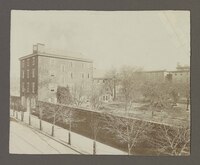 Magdalen Society of Philadelphia photographs, approximately 1875, 1974
Magdalen Society of Philadelphia photographs, approximately 1875, 1974 Photographs of the Magdalen Society's property taken in two periods: the late 19th century and in 1974.
-
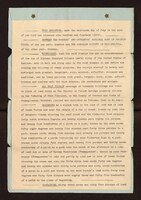 Magdalen Society of Philadelphia property deed, 1914
Magdalen Society of Philadelphia property deed, 1914 A certified copy of the deed to the property of 21st and Race St.
-
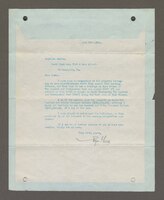 Magdalen Society of Philadelphia property value report, 1914
Magdalen Society of Philadelphia property value report, 1914 This report measures the physical dimensions of the Magdalen Society's property at 21st and Race St. and approximates its value at $130,000.
-
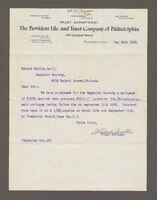 Magdalen Society of Philadelphia mortgage documents, 1898
Magdalen Society of Philadelphia mortgage documents, 1898 A notice from The Provident Life and Trust Company of Philadelphia informing the secretary of the Magdalen Society, Edward Bettle, of the purchase for the Society a mortgage of $3500.
-
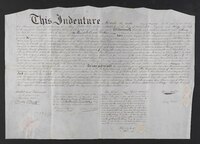 Magdalen Society of Philadelphia property deed, 1833
Magdalen Society of Philadelphia property deed, 1833 A deed for property on 21st and Race St.
-
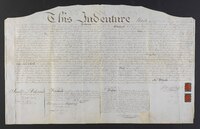 Magdalen Society of Philadelphia property deed, 1807
Magdalen Society of Philadelphia property deed, 1807 A deed for property on 21st and Race St.
-
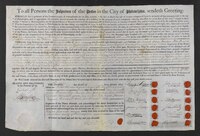 Magdalen Society of Philadelphia property deed, 1808
Magdalen Society of Philadelphia property deed, 1808 A deed for property on 21st and Race St.
-
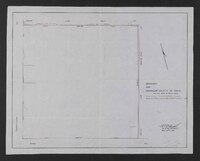 Magdalen Society of Philadelphia property survey, 1910
Magdalen Society of Philadelphia property survey, 1910 This survey measures the basic countours of the Magdalen Society's property on 21st and Race St.
 Magdalen Society of Philadelphia seal, undated The official seal and die of the Magdalen Society of Philadelphia displays a woman in anguish aided by a sanguine man who points the way to asylum. Symbolically, the woman appears next to a willow tree and the man an olive tree. Both figures appear in classical garb: the women dones a peplos and the man a chiton and chlamys.
Magdalen Society of Philadelphia seal, undated The official seal and die of the Magdalen Society of Philadelphia displays a woman in anguish aided by a sanguine man who points the way to asylum. Symbolically, the woman appears next to a willow tree and the man an olive tree. Both figures appear in classical garb: the women dones a peplos and the man a chiton and chlamys. Magdalen Society of Philadelphia minutes of the weekly visiting committee, 1885-1912 The function of the Magdalen Society's visiting committee was to monitor the women living in the asylum. The minutes provide details into the background and progress of the Society's inmates, and describe the behavior of those applying for release. Pages 257 to 471 of this volume are blank.
Magdalen Society of Philadelphia minutes of the weekly visiting committee, 1885-1912 The function of the Magdalen Society's visiting committee was to monitor the women living in the asylum. The minutes provide details into the background and progress of the Society's inmates, and describe the behavior of those applying for release. Pages 257 to 471 of this volume are blank. Magdalen Society of Philadelphia minutes of the weekly visiting committee, 1878-1885 The function of the Magdalen Society's visiting committee was to monitor the women living in the asylum. The minutes provide details into the background and progress of the Society's inmates, and describe the behavior of those applying for release.
Magdalen Society of Philadelphia minutes of the weekly visiting committee, 1878-1885 The function of the Magdalen Society's visiting committee was to monitor the women living in the asylum. The minutes provide details into the background and progress of the Society's inmates, and describe the behavior of those applying for release. Magdalen Society of Philadelphia matron's diary, 1916-1917 The matron's diary was maintained throughout the late nineteenth and early twentieth century while the Society was under the auspices of Elizabeth Freeberger. The manuscripts reveal the day to day happenings of the Society, including admission and dismissal information and stories about the women who lived in the house. They also detail the matrons' education strategies and approaches to reforming the inmates through work and prayer.
Magdalen Society of Philadelphia matron's diary, 1916-1917 The matron's diary was maintained throughout the late nineteenth and early twentieth century while the Society was under the auspices of Elizabeth Freeberger. The manuscripts reveal the day to day happenings of the Society, including admission and dismissal information and stories about the women who lived in the house. They also detail the matrons' education strategies and approaches to reforming the inmates through work and prayer. Magdalen Society of Philadelphia matron's diary, 1912-1916 The matron's diary was maintained throughout the late nineteenth and early twentieth century while the Society was under the auspices of Elizabeth Freeberger. The manuscripts reveal the day to day happenings of the Society, including admission and dismissal information and stories about the women who lived in the house. They also detail the matrons' education strategies and approaches to reforming the inmates through work and prayer. Pages 19 and 20 are missing in this volume.
Magdalen Society of Philadelphia matron's diary, 1912-1916 The matron's diary was maintained throughout the late nineteenth and early twentieth century while the Society was under the auspices of Elizabeth Freeberger. The manuscripts reveal the day to day happenings of the Society, including admission and dismissal information and stories about the women who lived in the house. They also detail the matrons' education strategies and approaches to reforming the inmates through work and prayer. Pages 19 and 20 are missing in this volume. Magdalen Society of Philadelphia matron's diary, 1908-1912 The matron's diary was maintained throughout the late nineteenth and early twentieth century while the Society was under the auspices of Elizabeth Freeberger. The manuscripts reveal the day to day happenings of the Society, including admission and dismissal information and stories about the women who lived in the house. They also detail the matrons' education strategies and approaches to reforming the inmates through work and prayer. Pages 19 and 20 are missing in this volume.
Magdalen Society of Philadelphia matron's diary, 1908-1912 The matron's diary was maintained throughout the late nineteenth and early twentieth century while the Society was under the auspices of Elizabeth Freeberger. The manuscripts reveal the day to day happenings of the Society, including admission and dismissal information and stories about the women who lived in the house. They also detail the matrons' education strategies and approaches to reforming the inmates through work and prayer. Pages 19 and 20 are missing in this volume. Magdalen Society of Philadelphia matron's diary, 1906-1908 The matron's diary was maintained throughout the late nineteenth and early twentieth century while the Society was under the auspices of Elizabeth Freeberger. The manuscripts reveal the day to day happenings of the Society, including admission and dismissal information and stories about the women who lived in the house. They also detail the matrons' education strategies and approaches to reforming the inmates through work and prayer. Pages 147 to 200 of this volume are blank.
Magdalen Society of Philadelphia matron's diary, 1906-1908 The matron's diary was maintained throughout the late nineteenth and early twentieth century while the Society was under the auspices of Elizabeth Freeberger. The manuscripts reveal the day to day happenings of the Society, including admission and dismissal information and stories about the women who lived in the house. They also detail the matrons' education strategies and approaches to reforming the inmates through work and prayer. Pages 147 to 200 of this volume are blank. Magdalen Society of Philadelphia matron's diary, 1898-1906 The matron's diary was maintained throughout the late nineteenth and early twentieth century while the Society was under the auspices of Elizabeth Freeberger. The manuscripts reveal the day to day happenings of the Society, including admission and dismissal information and stories about the women who lived in the house. They also detail the matrons' education strategies and approaches to reforming the inmates through work and prayer.
Magdalen Society of Philadelphia matron's diary, 1898-1906 The matron's diary was maintained throughout the late nineteenth and early twentieth century while the Society was under the auspices of Elizabeth Freeberger. The manuscripts reveal the day to day happenings of the Society, including admission and dismissal information and stories about the women who lived in the house. They also detail the matrons' education strategies and approaches to reforming the inmates through work and prayer. Magdalen Society of Philadelphia matron's diary, 1891-1898 The matron's diary was maintained throughout the late nineteenth and early twentieth century while the Society was under the auspices of Elizabeth Freeberger. The manuscripts reveal the day to day happenings of the Society, including admission and dismissal information and stories about the women who lived in the house. They also detail the matrons' education strategies and approaches to reforming the inmates through work and prayer.
Magdalen Society of Philadelphia matron's diary, 1891-1898 The matron's diary was maintained throughout the late nineteenth and early twentieth century while the Society was under the auspices of Elizabeth Freeberger. The manuscripts reveal the day to day happenings of the Society, including admission and dismissal information and stories about the women who lived in the house. They also detail the matrons' education strategies and approaches to reforming the inmates through work and prayer. Magdalen Society of Philadelphia matron's diary, 1885-1891 The matron's diary was maintained throughout the late nineteenth and early twentieth century while the Society was under the auspices of Elizabeth Freeberger. The manuscripts reveal the day to day happenings of the Society, including admission and dismissal information and stories about the women who lived in the house. They also detail the matrons' education strategies and approaches to reforming the inmates through work and prayer.
Magdalen Society of Philadelphia matron's diary, 1885-1891 The matron's diary was maintained throughout the late nineteenth and early twentieth century while the Society was under the auspices of Elizabeth Freeberger. The manuscripts reveal the day to day happenings of the Society, including admission and dismissal information and stories about the women who lived in the house. They also detail the matrons' education strategies and approaches to reforming the inmates through work and prayer. Magdalen Society of Philadelphia matron's diary, 1881-1885 The matron's diary was maintained throughout the late nineteenth and early twentieth century while the Society was under the auspices of Elizabeth Freeberger. The manuscripts reveal the day to day happenings of the Society, including admission and dismissal information and stories about the women who lived in the house. They also detail the matrons' education strategies and approaches to reforming the inmates through work and prayer.
Magdalen Society of Philadelphia matron's diary, 1881-1885 The matron's diary was maintained throughout the late nineteenth and early twentieth century while the Society was under the auspices of Elizabeth Freeberger. The manuscripts reveal the day to day happenings of the Society, including admission and dismissal information and stories about the women who lived in the house. They also detail the matrons' education strategies and approaches to reforming the inmates through work and prayer. Magdalen Society of Philadelphia matron's diary, 1878-1881 The matron's diary was maintained throughout the late nineteenth and early twentieth century while the Society was under the auspices of Elizabeth Freeberger. The manuscripts reveal the day to day happenings of the Society, including admission and dismissal information and stories about the women who lived in the house. They also detail the matrons' education strategies and approaches to reforming the inmates through work and prayer.
Magdalen Society of Philadelphia matron's diary, 1878-1881 The matron's diary was maintained throughout the late nineteenth and early twentieth century while the Society was under the auspices of Elizabeth Freeberger. The manuscripts reveal the day to day happenings of the Society, including admission and dismissal information and stories about the women who lived in the house. They also detail the matrons' education strategies and approaches to reforming the inmates through work and prayer. Magdalen Society of Philadelphia matron's diary, 1829-1835 The matron's diary was maintained throughout the late nineteenth and early twentieth century while the Society was under the auspices of Elizabeth Freeberger. The manuscripts reveal the day to day happenings of the Society, including admission and dismissal information and stories about the women who lived in the house. They also detail the matrons' education strategies and approaches to reforming the inmates through work and prayer.
Magdalen Society of Philadelphia matron's diary, 1829-1835 The matron's diary was maintained throughout the late nineteenth and early twentieth century while the Society was under the auspices of Elizabeth Freeberger. The manuscripts reveal the day to day happenings of the Society, including admission and dismissal information and stories about the women who lived in the house. They also detail the matrons' education strategies and approaches to reforming the inmates through work and prayer. Magdalen Society of Philadelphia register, 1878-1910 The admission and discharge records trace the flow of inmates of the Magdalen Society. They also disclose detailed information about the lives of inmates and serve as a window to nineteenth century attitudes towards family and women. The manuscripts were fastidiously kept from 1836 until the Society’s transition to the White-Williams Foundation in 1917, and provide inmate names and dates of occupancy. Brief descriptions of discharge are often given. Many women were sent back to their families or simply left at their own volition, while others are noted to have “escaped” or were ejected for “improper conduct.” Women who died in the house are regularly indicated to have been interred in the yard of the property. Some accounts offer more substantive background information. The first entry of the Society’s register, for instance, recounts the admission of a young girl who was spurned by her family for being “seduced…by her father’s coachman.” Indeed, family member death or neglect are some of the most common remarks provided. The admission and discharge records are a boon to researchers interested in post-revolutionary philanthropic organizations and the history of women and society in general in the nineteenth and early twentieth centuries. Pages 365 to 492 of this volume are blank.
Magdalen Society of Philadelphia register, 1878-1910 The admission and discharge records trace the flow of inmates of the Magdalen Society. They also disclose detailed information about the lives of inmates and serve as a window to nineteenth century attitudes towards family and women. The manuscripts were fastidiously kept from 1836 until the Society’s transition to the White-Williams Foundation in 1917, and provide inmate names and dates of occupancy. Brief descriptions of discharge are often given. Many women were sent back to their families or simply left at their own volition, while others are noted to have “escaped” or were ejected for “improper conduct.” Women who died in the house are regularly indicated to have been interred in the yard of the property. Some accounts offer more substantive background information. The first entry of the Society’s register, for instance, recounts the admission of a young girl who was spurned by her family for being “seduced…by her father’s coachman.” Indeed, family member death or neglect are some of the most common remarks provided. The admission and discharge records are a boon to researchers interested in post-revolutionary philanthropic organizations and the history of women and society in general in the nineteenth and early twentieth centuries. Pages 365 to 492 of this volume are blank. Magdalen Society of Philadelphia records of admissions and discharges, 1908-1917 The admission and discharge records trace the flow of inmates of the Magdalen Society. They also disclose detailed information about the lives of inmates and serve as a window to nineteenth century attitudes towards women and family life. The manuscripts were fastidiously kept from 1836 until the Society’s transition to the White-Williams Foundation in 1917, and provide residents' names and dates of occupancy. Brief descriptions of discharge are often given. Many women were sent back to their families or simply left at their own volition, while others are noted to have “escaped” or were ejected for “improper conduct.” Women who died in the house are regularly indicated to have been interred in the yard of the property. Some accounts offer more substantive background information. The first entry of the Society’s register, for instance, recounts the admission of a young girl who was spurned by her family for being “seduced…by her father’s coachman.” Indeed, family member death or neglect are some of the most common remarks provided. The admission and discharge records are a boon to researchers interested in post-revolutionary philanthropic organizations and the history of women and society in general in the nineteenth and early twentieth centuries. Pages 104 to 301 of this volume are blank.
Magdalen Society of Philadelphia records of admissions and discharges, 1908-1917 The admission and discharge records trace the flow of inmates of the Magdalen Society. They also disclose detailed information about the lives of inmates and serve as a window to nineteenth century attitudes towards women and family life. The manuscripts were fastidiously kept from 1836 until the Society’s transition to the White-Williams Foundation in 1917, and provide residents' names and dates of occupancy. Brief descriptions of discharge are often given. Many women were sent back to their families or simply left at their own volition, while others are noted to have “escaped” or were ejected for “improper conduct.” Women who died in the house are regularly indicated to have been interred in the yard of the property. Some accounts offer more substantive background information. The first entry of the Society’s register, for instance, recounts the admission of a young girl who was spurned by her family for being “seduced…by her father’s coachman.” Indeed, family member death or neglect are some of the most common remarks provided. The admission and discharge records are a boon to researchers interested in post-revolutionary philanthropic organizations and the history of women and society in general in the nineteenth and early twentieth centuries. Pages 104 to 301 of this volume are blank. Magdalen Society of Philadelphia records of admissions and discharges, 1878-1908 The admission and discharge records trace the flow of inmates of the Magdalen Society. They also disclose detailed information about the lives of inmates and serve as a window to nineteenth century attitudes towards women and family life. The manuscripts were fastidiously kept from 1836 until the Society’s transition to the White-Williams Foundation in 1917, and provide residents' names and dates of occupancy. Brief descriptions of discharge are often given. Many women were sent back to their families or simply left at their own volition, while others are noted to have “escaped” or were ejected for “improper conduct.” Women who died in the house are regularly indicated to have been interred in the yard of the property. Some accounts offer more substantive background information. The first entry of the Society’s register, for instance, recounts the admission of a young girl who was spurned by her family for being “seduced…by her father’s coachman.” Indeed, family member death or neglect are some of the most common remarks provided. The admission and discharge records are a boon to researchers interested in post-revolutionary philanthropic organizations and the history of women and society in general in the nineteenth and early twentieth centuries. Pages 134 to 144 of this volume are blank.
Magdalen Society of Philadelphia records of admissions and discharges, 1878-1908 The admission and discharge records trace the flow of inmates of the Magdalen Society. They also disclose detailed information about the lives of inmates and serve as a window to nineteenth century attitudes towards women and family life. The manuscripts were fastidiously kept from 1836 until the Society’s transition to the White-Williams Foundation in 1917, and provide residents' names and dates of occupancy. Brief descriptions of discharge are often given. Many women were sent back to their families or simply left at their own volition, while others are noted to have “escaped” or were ejected for “improper conduct.” Women who died in the house are regularly indicated to have been interred in the yard of the property. Some accounts offer more substantive background information. The first entry of the Society’s register, for instance, recounts the admission of a young girl who was spurned by her family for being “seduced…by her father’s coachman.” Indeed, family member death or neglect are some of the most common remarks provided. The admission and discharge records are a boon to researchers interested in post-revolutionary philanthropic organizations and the history of women and society in general in the nineteenth and early twentieth centuries. Pages 134 to 144 of this volume are blank. Magdalen Society of Philadelphia records of admissions and discharges, 1836-1886 The admission and discharge records trace the flow of inmates of the Magdalen Society. They also disclose detailed information about the lives of inmates and serve as a window to nineteenth century attitudes towards women and family life. The manuscripts were fastidiously kept from 1836 until the Society’s transition to the White-Williams Foundation in 1917, and provide residents' names and dates of occupancy. Brief descriptions of discharge are often given. Many women were sent back to their families or simply left at their own volition, while others are noted to have “escaped” or were ejected for “improper conduct.” Women who died in the house are regularly indicated to have been interred in the yard of the property. Some accounts offer more substantive background information. The first entry of the Society’s register, for instance, recounts the admission of a young girl who was spurned by her family for being “seduced…by her father’s coachman.” Indeed, family member death or neglect are some of the most common remarks provided. The admission and discharge records are a boon to researchers interested in post-revolutionary philanthropic organizations and the history of women and society in general in the nineteenth and early twentieth centuries.
Magdalen Society of Philadelphia records of admissions and discharges, 1836-1886 The admission and discharge records trace the flow of inmates of the Magdalen Society. They also disclose detailed information about the lives of inmates and serve as a window to nineteenth century attitudes towards women and family life. The manuscripts were fastidiously kept from 1836 until the Society’s transition to the White-Williams Foundation in 1917, and provide residents' names and dates of occupancy. Brief descriptions of discharge are often given. Many women were sent back to their families or simply left at their own volition, while others are noted to have “escaped” or were ejected for “improper conduct.” Women who died in the house are regularly indicated to have been interred in the yard of the property. Some accounts offer more substantive background information. The first entry of the Society’s register, for instance, recounts the admission of a young girl who was spurned by her family for being “seduced…by her father’s coachman.” Indeed, family member death or neglect are some of the most common remarks provided. The admission and discharge records are a boon to researchers interested in post-revolutionary philanthropic organizations and the history of women and society in general in the nineteenth and early twentieth centuries. Magdalen Society of Philadelphia photographs, approximately 1875, 1974 Photographs of the Magdalen Society's property taken in two periods: the late 19th century and in 1974.
Magdalen Society of Philadelphia photographs, approximately 1875, 1974 Photographs of the Magdalen Society's property taken in two periods: the late 19th century and in 1974. Magdalen Society of Philadelphia property deed, 1914 A certified copy of the deed to the property of 21st and Race St.
Magdalen Society of Philadelphia property deed, 1914 A certified copy of the deed to the property of 21st and Race St. Magdalen Society of Philadelphia property value report, 1914 This report measures the physical dimensions of the Magdalen Society's property at 21st and Race St. and approximates its value at $130,000.
Magdalen Society of Philadelphia property value report, 1914 This report measures the physical dimensions of the Magdalen Society's property at 21st and Race St. and approximates its value at $130,000. Magdalen Society of Philadelphia mortgage documents, 1898 A notice from The Provident Life and Trust Company of Philadelphia informing the secretary of the Magdalen Society, Edward Bettle, of the purchase for the Society a mortgage of $3500.
Magdalen Society of Philadelphia mortgage documents, 1898 A notice from The Provident Life and Trust Company of Philadelphia informing the secretary of the Magdalen Society, Edward Bettle, of the purchase for the Society a mortgage of $3500. Magdalen Society of Philadelphia property deed, 1833 A deed for property on 21st and Race St.
Magdalen Society of Philadelphia property deed, 1833 A deed for property on 21st and Race St. Magdalen Society of Philadelphia property deed, 1807 A deed for property on 21st and Race St.
Magdalen Society of Philadelphia property deed, 1807 A deed for property on 21st and Race St. Magdalen Society of Philadelphia property deed, 1808 A deed for property on 21st and Race St.
Magdalen Society of Philadelphia property deed, 1808 A deed for property on 21st and Race St. Magdalen Society of Philadelphia property survey, 1910 This survey measures the basic countours of the Magdalen Society's property on 21st and Race St.
Magdalen Society of Philadelphia property survey, 1910 This survey measures the basic countours of the Magdalen Society's property on 21st and Race St.